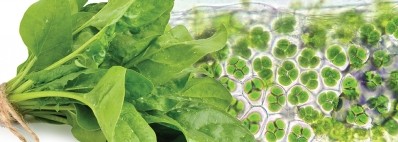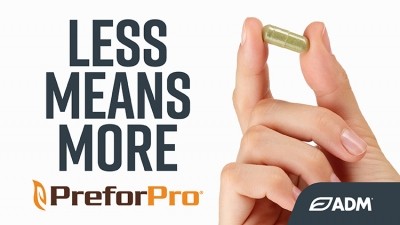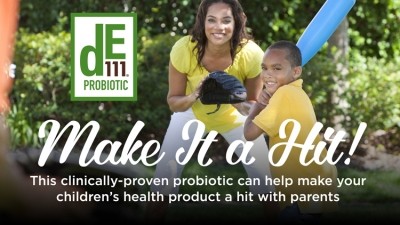Promotional Features
Natural mixology: blending form and function
Natural mixology: Blending form and function
Sparkling beverages and seltzers, kombuchas, exotic juice blends targeted for sleep or energy, cardio care and more – consumers are drinking these with gusto. Packaged snacks and foods with health benefits are also witnessing potent growth. Just one example is the 2018 launch of functional popcorn (with 10 g whey protein for sports performance) by Protes, which also has market success with its whey protein chips. The company has experienced triple-digit growth since its 2013 launch.
This is just one example of consumers turning away from conventional pills for nutrition and back to foods for health. But these “health foods” go beyond fulfilling mere nutritional requirements. Consumers demand they provide targeted health support (eg, energy, cognitive acuity, joint mobility, etc.) – plus, these foods and beverages need to impart an appealing flavor profile (and thanks to significant developments from natural flavor suppliers, this demand is more easily fulfilled).
The Institute of Medicine’s Food and Nutrition Board (IOM/FNB) defines functional foods as “any food or food ingredient that may provide a health benefit beyond the traditional nutrients it contains.”
In the case of the burgeoning growth of probiotics, yogurt, which naturally contains the Lactobacillus species is a healthy food, but dried fruit or granola with added probiotics for digestive or immune health is a functional food. In 2017, according to statista.com, functional foods was a category that reaped approximately $300 billion in sales globally and by 2022, this number is expected to incline sharply to approximately $440 billion.
Equally, demand for and sales of foods and beverages containing probiotics are exploding; in fact, 46% of grocery shoppers are actively looking for beverages that contain probiotics, according to a study by EcoFocus. Probiotics were also named as one of the top ten trends at Expo West 2017.
This year, according to Mintel’s Global Food and Drink Trends 2018, “more consumers will be looking for ingredients, products and combinations of food and drink that provide nutrition, physical or emotional benefits that advance their priorities for self-care.”
Accelerated research into components of the vast human microbiome continues to discover how beneficial bacteria work to maintain, and in many cases restore, health. The result is that consumers are continuing to seek out products that they already enjoy but with probiotic specific benefits.
There are four top beverage categories that are seeing accelerated innovation and growth – and many formulators are seeking to add probiotics for functional benefit. These categories include:
Functional waters: These are quickly outpacing conventional carbonated drinks (sodas), and younger consumers are preferring sparkling waters flavored with natural fruits and vegetable juices.
Performance/fitness drinks: Energy drinks that are not nervous-system stimulating are growing, and boomers (seniors) are driving much of this growth. Further, mainstream sports drinks are growing at 3.2%.
Juice: Juices made through cold pasteurization (or HPP, a natural process) are seeing sales surges, while conventional juices are down. Additionally, 18% of consumers want juices with functional benefits.
Milk alternatives: Younger consumers and vegans are driving the trends for milk alternatives such as soy, almond, cashew, coconut, etc.
These beverage sectors are all currently growing because more consumers are refusing sugary soft drinks and beverages that have no nutrition or targeted health benefit. Therefore, the demand for healthier beverages continues to call for innovation, and functional beverages are now sweeping the market.
As functional beverages are launched at an accelerated rate, ready-to-drink probiotics are gaining market share. Demand specifically for probiotics in functional beverages is now higher than ever.
DE111: Resolving challenges and adding function
When developing new probiotic beverages, one problem manufacturers may encounter is finding a substantial strain with proven functional benefits that can withstand their manufacturing processes. And, since many beneficial ingredients like probiotics can lose their efficacy in processing or have a limited shelf life, finding the right blend of ingredients to create a functional beverage that solves a wide-range of consumers’ health goals such as promoting muscle recovery, or smoother digestion, is no easy feat.
A spore-forming probiotic strain Bacillus subtilis is often a compatible solution because this microorganism’s tough outer shell allows it to withstand abrasive processing, and is compatible with beverages ranging from juices to alternative milks. Probiotics like Bacillus subtilis promote the growth of beneficial bacteria in the gut, offering the additional health benefits that today’s consumers seek out in functional beverages.
Of the many probiotic strain options that manufacturers can choose from when formulating functional beverages, B. subtilis is frequently the best choice available. One unique probiotic strain of B. subtilis (DE111) is especially stable under many conditions. DE111 homogenizes well with almost any liquid, remains viable within a wide pH range and can be incorporated into dry mixes. B. subtilis doesn’t germinate until it reaches the right environment – in the gastrointestinal tract. This means you can use B. subtilis in such stringent processes as high-pressure processing, flash pasteurization and hot fill.
These attributes make DE111 suitable for sparkling waters, juices, milks, powdered drink mixes, sports drinks and other applications that less-hardy probiotics would be unable to tolerate ─ and market research supports probiotic use in these applications.
For example, DE111 can be touted for several functional benefits – improved sports and fitness performance and body composition. A double-blind, randomized, placebo-controlled study of collegiate female athletes showed DE111 produced statistically significant improvements in the reduction of body fat percentage and improved performance, when consumed with adequate post-workout nutrition.
Further, DE111 is also clinically proven to control microbial populations in the gut, promote regularity and help maintain general health. It has been genome sequenced for safety and clinically proven to support digestive and immune health.
Raise your share of the booming beverage business with DE111. Consumers today seek out beverages that are not only pleasurable to consume but also perform a health function beyond providing some daily value percentage.






